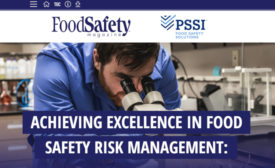Risk Assessment
Risk assessment involves strategies, practices, and protocols for assessing, analyzing, and mitigating risks to food safety and quality in business operations.
ARTICLES
Fundamentals of Conducting an Allergen Gap Assessment
Conducting an allergen gap assessment is one way to ensure regulatory compliance and consumer safety
April 15, 2024
Applying Industry 4.0 to Food Safety
The opportunities for strengthening food safety through the adoption of Industry 4.0 technologies across the food supply chain are vast
April 11, 2024
Malevolent AI: Navigating the Shadows of Technology Advancement in the Food Industry
AI's integration into the food industry has been largely beneficial, streamlining processes from production to distribution; however, this integration also opens doors for malevolent use
April 10, 2024
Where Food Safety Systems and Culture Collide: Do You Know Your Company's Psychosocial Risks?
Psychosocial risks become important to food safety when they have the potential for causing psychological or physical harm, and when they lead to deficiencies in expected food safety behaviors
April 9, 2024
EVENTS
Webinar
9/26/23 to 9/26/24
Contact: Vania Halabou
Foreign Object Control: Best Practices in Food Processing and Foodservice
Webinar
2/22/24 to 2/22/25
Contact: Vania Halabou
Applied Root Cause Analysis: Using Your Results to Effectively Manage Risk
Never miss the latest news and trends driving the food safety industry
eNewsletter | Website | eMagazine
JOIN TODAY!Copyright ©2024. All Rights Reserved BNP Media.
Design, CMS, Hosting & Web Development :: ePublishing










